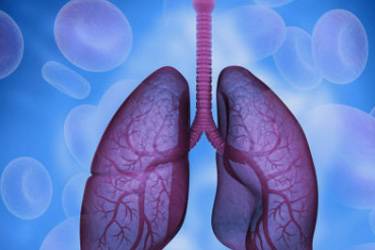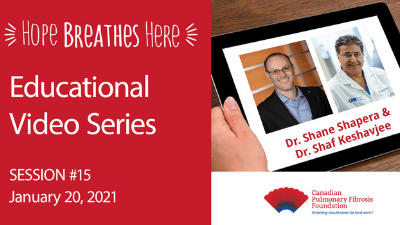Pulmonary Fibrosis Treatment & Care
Although there is no cure for pulmonary fibrosis, there are treatment options to help deal with symptoms and to slow the progress of the disease. Pulmonary fibrosis treatment options have advanced a great deal in the past decade and research continues today to improve our knowledge of the disease and to develop new and improved treatments.
Oxygen Therapy
As your disease progresses, your lungs become smaller and stiffer and the oxygen levels in your blood will gradually decrease. At some point you may need supplemental oxygen only when you are physically active. Eventually you may need additional oxygen all the time. Oxygen therapy is a pulmonary fibrosis treatment that enables your body to continue to function. This will help you remain as fit and active as possible, maintaining your quality of life.


Medication
Depending on the type of pulmonary fibrosis you have, there are pulmonary fibrosis treatment medications available to treat most of them. Anti-fibrotic medications, approved by Health Canada in 2015, have been a game changer, reducing the progression of lung fibrosis by up to 50 per cent. Anti-inflammatory and immunosuppressant medications may also be prescribed, depending on the cause of your pulmonary fibrosis.
Pulmonary Rehabilitation
Pulmonary rehabilitation is an important treatment for PF. It includes: exercise training; breathing exercises; ways to deal with stress, anxiety, and depression; nutritional counseling; education about your disease, and support from professionals and other patients with lung disease. The goal of pulmonary rehabilitation is to help you function without extreme breathlessness, and to allow you to safely exercise to improve your quality of life.

Lung Transplantation
Currently a lung transplant is the only effective cure for pulmonary fibrosis. This involves a complex surgery to replace one or both of your damaged lungs with healthy lungs. At some stage, you may be considered for lung transplantation. A transplant team will assess if your lung failure is severe enough to need transplantation; that you will be able to safely tolerate the surgery; that you have family support; and that you understand the benefits and risks (infection, rejection, medication side effects, etc). Not everyone with pulmonary fibrosis will need a lung transplant. There are also many reasons you may NOT qualify for a lung transplant, or choose to decline this option for yourself. It is a serious and complicated decision you will make with your medical team.
More on Pulmonary Fibrosis Treatment & Care
Drug Therapy for Pulmonary Fibrosis – Dr. Martin Kolb
A Patient’s Journey with Oxygen – Ron Flewett
IPF Therapies: Pills to Lung Transplants – Dr. Shapera & Dr. Keshavjee
Read Next…
The Harvey family had to move to Ontario for Eileen Joyce to get the care and liquid oxygen she needs
When Eileen Joyce Harvey was 58 years old, she packed up to head for Toronto with her husband Bill and…
Home Delivery of Liquid Oxygen Not Available to PF Patients in Most Parts of Canada
Each province and territory have different funding programs for home oxygen therapy and unless you live in Ontario home delivery…
Access to Oxygen Therapy in Canada Reports
Learn what PF patients, health care pros and oxygen providers are saying about Oxygen in Canada.
Oxygen Therapy Frequently Asked Questions
These Oxygen Therapy FAQs from ProResp provides tips for safely using oxygen at home and when traveling.
Making a Case for Oxygen Therapy Survey
Learn about the results of a survey conducted by Dr. Kerri Johannson of the University of Calgary where she asked 45…
How to Access Oxygen Therapy in Canada
Learn about the requirements necessary to access supplemental oxygen coverage under federal and provincial programs. Your medical team and oxygen…






